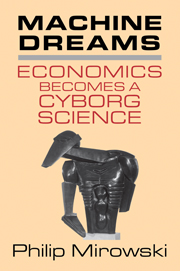Crossref Citations
This Book has been
cited by the following publications. This list is generated based on data provided by Crossref.
Mirowski, Philip
2001.
What’s Kuhn got to do with it?.
History of the Human Sciences,
Vol. 14,
Issue. 2,
p.
97.
Klaes, Matthias
2001.
Begriffsgeschichte: between the Scylla of Conceptual and the Charybdis of Institutional History of Economics.
Journal of the History of Economic Thought,
Vol. 23,
Issue. 2,
p.
153.
Hands, D. Wade
2001.
Economic methodology is dead - long live economic methodology: thirteen theses on the new economic methodology.
Journal of Economic Methodology,
Vol. 8,
Issue. 1,
p.
49.
Davis, John B.
2002.
The Emperor's Clothes.
Journal of the History of Economic Thought,
Vol. 24,
Issue. 2,
p.
141.
Pickering, Andrew
2002.
Cybernetics and the Mangle.
Social Studies of Science,
Vol. 32,
Issue. 3,
p.
413.
Fuller, Steve
2003.
The Critique of Intellectuals in a Time of Pragmatist Captivity.
History of the Human Sciences,
Vol. 16,
Issue. 4,
p.
19.
L. Axtell, Robert
2003.
Meeting the Challenge of Social Problems via Agent-Based Simulation.
p.
3.
MacKenzie, Donald
2003.
An Equation and its Worlds.
Social Studies of Science,
Vol. 33,
Issue. 6,
p.
831.
Morgan, Mary S.
2003.
The Cambridge History of Science.
p.
275.
Regoczei, Stephen
2004.
The Invisible Hand and the Common Good.
p.
90.
Ananyin, O.
2004.
Economics: How Is It Done and What Are the Outcomes? (On the Book by M. Blaug "The Methodology of Economics or How Economists Explain").
Voprosy Ekonomiki,
p.
149.
Sent, Esther-Mirjam
2004.
The legacy of Herbert Simon in game theory.
Journal of Economic Behavior & Organization,
Vol. 53,
Issue. 3,
p.
303.
Cetina, Karin Knorr
and
Bruegger, Urs
2004.
The Blackwell Cultural Economy Reader.
p.
121.
ROSSER, J. Barkley
2004.
Epistemological Implications of Economic Complexity.
Annals of the Japan Association for Philosophy of Science,
Vol. 13,
Issue. 1,
p.
45.
Carrette, Jeremy
2004.
Cyborg Politics and Economic Realities: Reflections on Elaine Graham'sRepresentations of the Post/Human.
Theology & Sexuality,
Vol. 10,
Issue. 2,
p.
45.
Levy, David M.
2004.
Machine Dreams: Economics Becomes a Cyborg Science.
Journal of Economic Behavior & Organization,
Vol. 53,
Issue. 3,
p.
423.
Mearman, Andrew
2005.
Sheila Dow's concept of dualism: clarification, criticism and development.
Cambridge Journal of Economics,
Vol. 29,
Issue. 4,
p.
619.
Mallard, Grégoire
2005.
Rationalizing capitalist democracy : the cold war origins of rational choice liberalism.
Critique internationale,
Vol. 26,
Issue. 1,
p.
161.
Rowland, Wade
2005.
Recognizing the Role of the Modern Business Corporation in the “Social Construction” of Technology.
Social Epistemology,
Vol. 19,
Issue. 2-3,
p.
287.
Carrette, Jeremy
2005.
Soul, Psyche, Brain.
p.
242.



